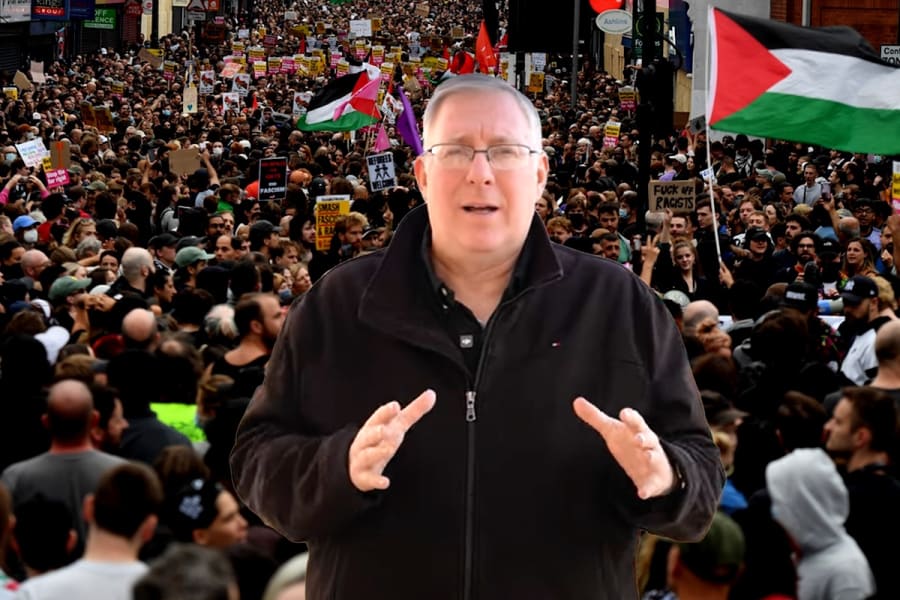I hate this hostage deal, but here's why I support it

When it comes to the hostage deal, I hate it, but I support it.
Let me explain why.
I'm going to start with the things I hate about this deal.
I do not like negotiating with terrorists. It's not something I believe in, but that's what's happening.
I don't like that.
Israel is giving 30 Palestinian terrorist prisoners and murderers and releasing them for every single live hostage we get back, except for the Israeli women soldiers that would be released.
For every one of the hostages that are women IDF soldiers being held by Hamas in those terror dungeons in Gaza, Israel is giving 50 Palestinian terrorist prisoners their freedom, releasing them.
Now, it's not exactly clear as I write this, where they're going to be released.
Are they actually going to be released back into Gaza?
Why would we put terrorists that we captured back into Gaza?
Israel has made it clear they're not allowing these terrorist prisoners to go into into the Palestinian Authority area in the West Bank. What Israelis call the biblical region of Judea and Samaria.
We're not putting them in the West Bank...why? Because these are Hamas supporters, and they are going to come together and try to mobilize and overthrow, disrupt, and destabilize the Palestinian Authority. That's the last thing we need. We don't need the West Bank further destabilized. We already have enough problems.
Israel could put all these terrorists in Gaza. They could send them to Qatar – the Sunni Arab island in the Middle East, rich in oil, which has been navigating both sides of the geopolitical divide.
On the one hand, Qatar is an ally of the United States.
On the other hand, it's an ally of the Iranian regime.
And for years – for decades – Qatar has hosted Hamas senior leaders in Doha, the capital city. These folks live in the lap of luxury in beautiful luxury, high rise apartments. You could send these terrorists there, or there's another option people are talking about, which is that Israel could send these released terrorist prisoners to Turkey.
Since President Recep Erdogan wants to be the sultan of the radical Islamist world and reassert the power and the glory of the Ottoman Empire from the pre-Turkey days.
Where are you going put them?
I don't want to release any of them.
Okay, so that's one of the reasons I hate the deal.
I hate negotiating with terrorists.
I hate releasing murderers – people that already have blood on their hands.
They're already convicted of trying to kill, and killing, wounding, maiming, and terrorizing. Radical Islamists are attacking and killing Jews, Israelis. Nobody wants to release these people.
I further hate this deal because I don't like the idea that we make a ceasefire in Gaza and that the Hamas leadership is already saying, "We won, we won, we survived, we survived. We did it. We did it. We we brought down the little Satan. They didn't stop us. They spent 15 months fighting us, but we didn't give up."
I hate giving radical Islamists a propaganda coup.
So now you may say, "Joel, you just made the case why Israel shouldn't do this," but here's the alternate case.
This is why I support the deal.
I don't like the deal.
I hate the deal.
However, I believe the time is right to do it.
The reason is because Israel is a small country and we cannot have a situation where people get captured by demon-possessed Hamas terrorists while they're in their pajamas on a Sabbath morning, dragged into hell, tortured every single day for 471 plus days and then just leave them there.
If fighting alone was going to get them out, they'd be out.
It's been 15 months and Israel has made huge gains.
Please keep this in mind if you are thinking I'm criticizing Israel for doing this.
Why would they do it?
I understand the feeling, but let me start with the compassion.
There is a humanitarian, compassionate, and an "love your neighbor" aspect.
There were 98 Israelis, Americans and other foreigners held in those terror dungeons.
We don't know how many of those are alive, but we know at least several dozen still are alive.
We need to get them out.
If just fighting alone was going to get them out, it would have worked.
If just diplomacy alone would get them out, if just international pressure on Hamas alone would work, then, then they'd be out.
But they're not out.
So, I think it's just compassion.
How can Israeli government says to its own people, "We're not going to move every stone to get our people back."
There's a binding social contract.
We owe it to these people to get them back.
Now you're saying, "Joel, Israel is going to keep having to fight radical Islamism, including in Gaza because you're now releasing prisoners and you're giving them a propaganda coup."
I get it.
Israelis get it.
However, the polls are overwhelming here.
70 to 75% in every single poll says the Israeli people want a hostage deal, even if it means a temporary ceasefire, and even if it means releasing more terror prisoners which we don't want to do.
Of course, we're all opposed to that, but we're willing to do it and take a ceasefire in Gaza.
The risk is that we may be told Hamas has prevailed and survived – along with everything else – just to secure the release of our people, because, to us, their lives are worth more than anything else.
Israelis don't believe the government on about 70-75% of almost any issue.
So when you have that type of social consensus, it's because there's a social contract.
The Israeli people are saying to the government, "Look, we get there are a lot of considerations. We've been dealing with this for 15 months. But it's time. It's time to make a deal."
I would say there are a few other reasons to make the deal.
First, I opposed the Biden three stage proposal for a deal back in May of last year – which Israeli Prime Minister Netanyahu opposed as well.
Why did I oppose it? Why did many others oppose that deal, too?
Because at that point, Israel felt like Biden was telling us to surrender.
He called it a ceasefire, but he called it a "permanent ceasefire" when of course, we would want to get all our hostages back.
Think about what the world looked like, what Gaza looked like in May of last year.
Ismail Haniyeh, the head of Hamas, was still alive, still living "high on the hog" as it were, in the lap of luxury in Doha. He was alive and well, pumping out radical Islamist jihadist propaganda as well as anti-Israel and anti-Semitic propaganda.
Additionally, Yahya Sinwar, the demon-possessed chief strategist of the Oct. 7 invasion and massacre, was still alive and fighting and making decisions in Gaza.
In May of last year, when Biden wanted us to just say, "Okay, enough is enough. Let's just call it quits," Mohammed Deif, the chief military official for Hamas, was still in Gaza, still alive, and still running his troops.
Israel by that point had taken out about 40-50% of the Hamas fighter terrorist troops, but now we're at about 80-85% that we've killed or severely wounded so they can't come back to the battlefield.
Now, Israel has assassinated both Ismail Haniyeh and Yahya Sinwar, as well as Mohammed Deif.
Last May, Biden was advising us not to invade Rafah, the southernmost city in Gaza, where most of the remaining Hamas leaders and and terror troops were operating.
Netanyahu listened to both Biden and Harris, but respectfully disagreed, decisively sending Israeli forces into Rafah, where we killed Yahya Sinwar, killed and captured many more Hamas terrorists, seized weapons, uncovered more tunnels, and destroyed them.
My point is, we’re in a very different place now.
We are not where we were last May.
Hamas is nearly destroyed, though not completely.
Don't get me wrong – Israel has decided that we're willing to keep fighting Hamas indefinitely.
We have the capability to hunt down all the remaining terrorists, even those we release.
We can do that, and we’re willing to, but ultimately, this is a choice we’re making.
The choice is to bring our people home while they’re still alive, and I support that.
Now, you may not agree, and I understand that.
However, I would ask you to show some compassion – for the families of the hostages, for the families of all the soldiers fighting to defeat Hamas and secure the hostages’ release, and, of course, for the hostages themselves.
Imagine if it were your husband, wife, mother, father, daughter, son, cousin that was trapped there for 471 days, being tortured every single day.
Wouldn't you want a strong government to make a deal on their behalf?
Get all of our people home.
Get them into recovery – physical, spiritual, emotional – and go live to fight another day.
Israel has destroyed enough of Hamas and enough of Hezbollah in the north that right now we feel okay.
These are challenges, but they're not existential threats the way they were.
That's what gives Netanyahu the feeling that he can make a deal now.
I will say one last thing.
If it were Biden pushing Bibi to do it right now alone, Netanyahu would have a hard time because there has been a very contentious relationship between him and Biden.
Biden says he loves Israel, but he's been very cruel toward Prime Minister Netanyahu.
There have been leaks, all kinds of vulgar language that Biden has used about Netanyahu.
Biden has promised weapons then refused to send them in order to leverage Netanyahu to give up and surrender.
There's been there's a lot of bad blood.
Even though there's a prickly relationship between President-elect Donald Trump and Prime Minister Netanyahu where they have had some tensions over the years, they're allies.
They see each other as allies, and they want to work together.
Trump wants Israel to win, but he also wants the hostages home.
Trump sent his own negotiator, Steve Witkoff, to get the job done.
This was an interesting bipartisan move by Trump.
While we don't normally see Trump working in a bipartisan fashion, he did in this.
He worked with the Biden team, but it was the Trump team that has moved the dynamic.
Specifically, it was Trump's language threatening Hamas, repeatedly warning them, giving them ultimatums such as "there will be all hell to pay" regarding his demand to release the hostages by the time of his inauguration on January 20 that helped usher in the hostage release deal.
I talk about "The Trump Effect" in a different article.
It has had an effect on the Hamas leadership and on other world leaders, evil world leaders.
And what I'm saying is, Netanyahu has a lot of resistance from some of the far-right wing factions within his own government who are threatening to bolt the government if he says yes, but is Netanyahu really going to never get these hostages back?
He wants to get the hostages back.
His people and his critics say he doesn't really want them back, but he does want them back.
He just doesn't want to surrender, and now he feels like it's not surrendering.
These are manageable conflicts that he can continue.
He can make the deal and get the hostages back now.
What would be the point of a little country like Israel telling the new incoming leader of a of the world's only superpower, the United States, Donald Trump, "No, I'm not going to listen to your negotiator. I'm not going to listen to you. I'm not taking this deal. It's a bad deal. It's horrible deal. I'm not going to do it."
Trump is trying to help Israel, and that's what Netanyahu has realized, that this isn't the deal he wants either but the timing is right.
The President-elect of the United States coming in, Donald Trump, is the right guy to work with and there's so much more. We can work together if we can get this situation resolved.
So do I like this deal? I do not. I hate this deal, but I support it for these reasons.
And and you can take whatever position you want.
I understand that's what freedom is, but I want you to understand why I support this deal.
It's not the deal.
It's the timing to get these hostages out before they're all dead.
I hope that's helpful. Please keep praying, even when all the hostages are released, for the trauma that they and their families and all Israeli troops to be released and healed.
And of course, the suffering Palestinians in Gaza, the West Bank and elsewhere.
The suffering is so bad, the trauma is so deep that there's going to be so much need for emotional, physical and spiritual recovery.
That's another topic, but I wanted to lay that out for you. I want you to understand it.
Even if you have strong criticisms of this deal, I just ask you to remember the human element of the real lives being tortured every single day.
I've been in those tunnels.
I was there for three hours. These folks have been there for 471 plus days.
They have to come out and now is the moment.

Joel C. Rosenberg is the editor-in-chief of ALL ISRAEL NEWS and ALL ARAB NEWS and the President and CEO of Near East Media. A New York Times best-selling author, Middle East analyst, and Evangelical leader, he lives in Jerusalem with his wife and sons.













